EVENTS
Dui Hua Kicks Off New Year with Public Event
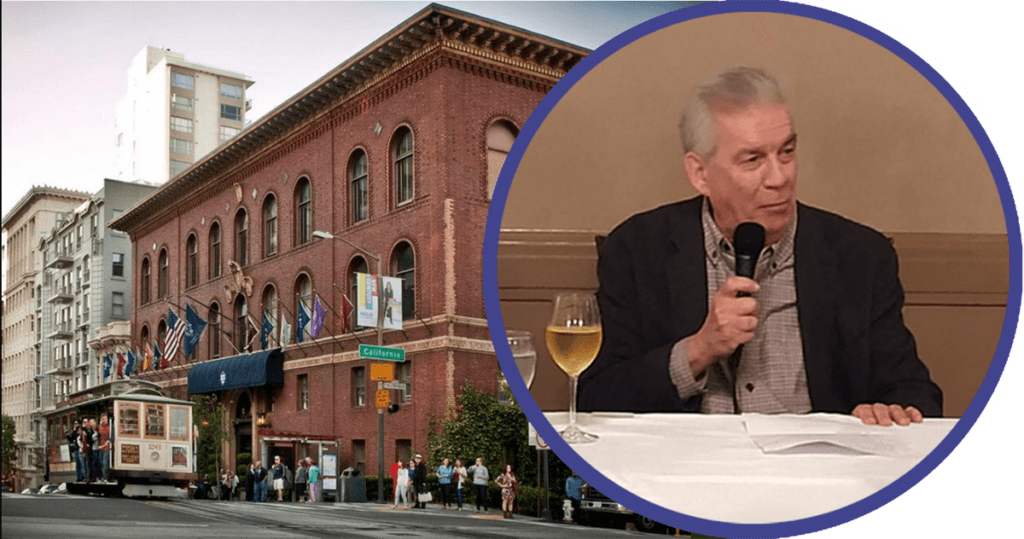
In what has become an annual event, Executive Director John Kamm addressed an enthusiastic, sold-out crowd at the University Club of San Francisco on the evening of January 12, 2023. As in the four previous addresses, Kamm focused on US-China relations, and the impact of domestic politics in the United States on the country’s policies towards China.
Kamm pointed out that Speaker McCarthy has prioritized China policy since winning the speakership after 15 rounds of voting in the House of Representatives. In his first speech, delivered in the early morning of January 7, 2023, McCarthy laid out the priorities of the new Republican majority, including restricting abortion rights, securing the southern border, and launching multiple investigations into Biden administration policies. Not surprisingly, Republican members applauded as McCarthy went through the list of priorities, while Democrats “sat on their hands.”
There was an exception. When McCarthy said that a priority of the new Congress is “standing up to the Chinese Communist Party,” the entire House stood up and loudly applauded. In the ensuing days, the House passed legislation establishing a select committee on China and banning sales of crude oil to companies tied to the PRC. The votes were bipartisan, reflecting what Kamm called “the one thing Republicans and Democrats agree on – hitting back at China’s alleged malign activities.”
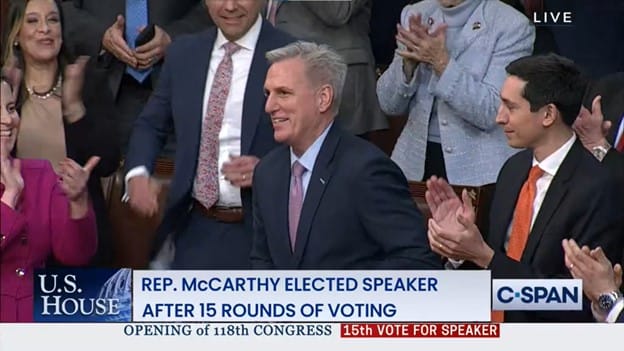
Taiwan
Kamm agreed with National Security Advisor Jake Sullivan that conflict between the United States and China over Taiwan is not inevitable, but he went one step further. Conflict over Taiwan is unlikely.
He cited the immense logistical challenges involved in coordinating and executing an air and sea invasion across 100 miles of heavily defended ocean against a determined foe fighting to preserve their democracy, and aided by militaries of the United States, Japan, and others. “It’s simply too risky,” Kamm opined. He recounted a conversation with a senior Chinese official several years ago. A failed invasion with heavy losses, the official said, would be the end of the Communist Party. That logic still holds, Kamm said. On top of multiple domestic failures including mishandling the Covid epidemic, the economy, and foreign affairs (e.g., supporting Russia in the Ukraine war) a failed invasion attempt would represent an existential threat to Communist Party rule.
Semiconductors & Other Topics
Kamm’s remarks lasted 40 minutes. They were followed by 50 minutes of Q&A, a lively exchange that covered multiple topics. The most time was spent on the Biden administration’s recently announced restrictions on transferring technology for manufacturing semiconductor chips, and the most advanced chips themselves to China. Chinese leaders are now convinced that the United States is determined to contain its growth in 21st century technologies.

In addition to Taiwan and the trade in semiconductors, Kamm rattled off a long list of other areas where the two countries are facing off. These included:
Confrontations in the South China and East China Seas – a recent near-collision between fighter jets of China and the United States is a matter of deep concern to the Pentagon.
Hong Kong – the United States, the United Kingdom, and allies claim that China is violating commitments made in the Joint Declaration. China accuses them of interfering in the city’s internal affairs.
Human rights in Xinjiang and Tibet – the United States accuses China of committing espionage and is enforcing the Xinjiang Forced Labor Act.
Detention of US citizens in China, and Chinese citizens in the United States, including the use of exit bans.
Economic espionage by Chinese agents bent on stealing American technology; the FBI opens a new investigation of Chinese economic espionage every 12 hours.
Mishandling of Covid – many in the United States continue to believe that China is responsible for the global pandemic, and has recently reimposed travel restrictions on Chinese travelers, a move roundly condemned by China.
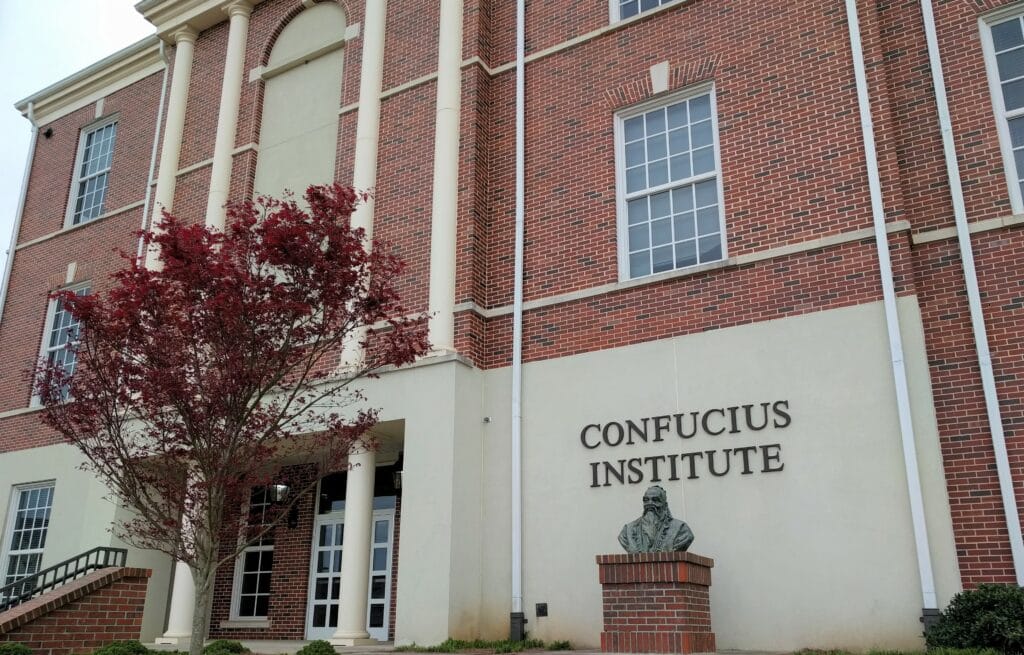
Kamm concluded his remarks by asking whether decoupling of the United States and China’s economies and societies is possible. He cast doubt that decoupling is possible given the links between the two countries, forged over more than 50 years. “That’s not to say, however that efforts to do so won’t be made.” An example is the closure of Confucius Institutes on American campuses. “Two years ago, there were around 110 institutes in the United States. After legislation was passed restricting access to US government funding, that number has fallen to seven.”
PUBLICATIONS ROUND UP
Featured: Prisoner Updates 2023 #1, January 23, 2023
Situation of anti-COVID control protesters worrisome
During his meeting with European Council President Charles Michel on December 1, 2022, President Xi Jinping tried to explain away the widespread protests against China’s “zero- Covid” policy by blaming the unrest on a few “frustrated” students. Soon after, China abruptly reversed course and relaxed all Covid controls without warning or preparation. Despite Xi’s tone of understanding towards the protestors when speaking in public, many participants of the protests have been subjected to coercive measures. Read more.
Sedition Cases in Hong Kong
The United Nations has expressed concerns about the Hong Kong government’s use of colonial-era sedition charges to suppress criticism or dissent. Despite not being covered by the Beijing-imposed national security law, the conditions for obtaining bail are difficult in sedition cases. Individuals convicted under this law face a maximum penalty of two years in prison. Read more.
Featured: Prisoner Updates 2023 #2, January 30, 2022
Elderly counterrevolutionaries continue serving their sentences
Dui Hua uncovered another case of an elderly counterrevolutionary who is still serving a prison sentence. Read more.
New Details Learned of in “Three Grades of Servants Sect” Case in Yunnan
From Yunnan, Dui Hua has uncovered new information on a case involving the “Three Grades of Servants Sect (三班仆人).” Read more.
Two Dissidents Sentenced for Inciting Subversion in December 2022
Prominent activist Guo Quan (郭泉) was handed a four-year prison sentence for inciting subversion in Nanjing on December 20, 2022, the second time he was convicted of the same crime. Guo, a longtime advocate of multiparty democracy, was detained on January 31, 2020, over a dozen articles he published criticizing officials who covered up the initial coronavirus outbreak in Wuhan. Some observers believe that Guo’s conviction was meant as a warning to those who took part in the recent blank paper protests against COVID restrictions, even as China lifted those controls virtually overnight. Read more.
Rights lawyer Tang Jitian Regains His Freedom
Tang Jilian (唐吉田) updated his social media with a photo and a message on January 14, 2023. Letting friends and supporters know that he has regained his freedom. Tang disappeared on December 10, 2021, when he was on the way to attend the International Human Rights Day event hosted by the EU in Beijing. Read more.
JOHN KAMM REMEMBERS
John Kamm Remembers is a feature that explores Kamm’s human rights advocacy prior to and since Dui Hua’s establishment in 1999. Learn about Kamm’s decades-long work in China here.
Operation Yellow Bird
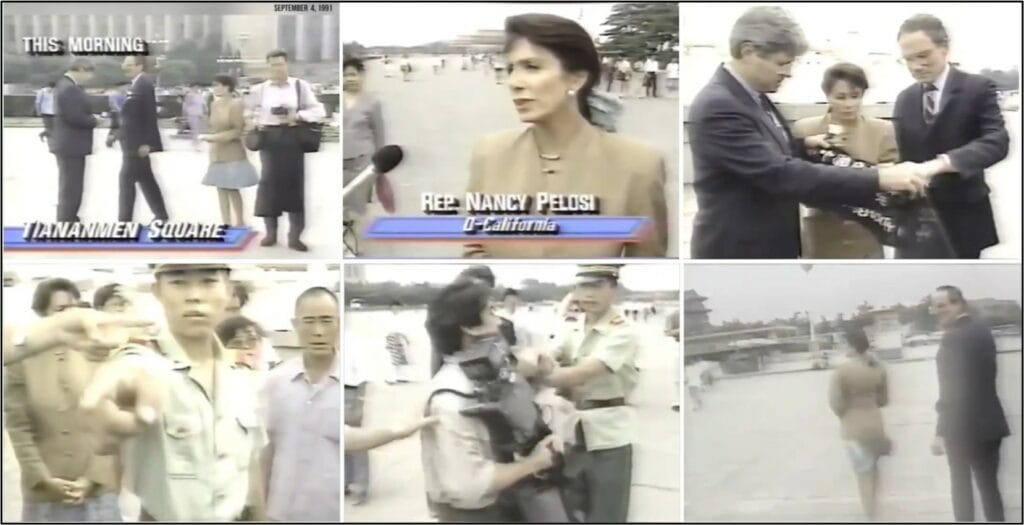
Speaker of the House Nancy Pelosi’s trip to Taiwan in early August 2022 was praised and criticized in equal measure. It resulted in massive Chinese military drills as well as a surge in foreign delegations to the island. China’s President Xi Jinping asked US President Joe Biden to intervene to stop Pelosi, but Mr. Biden declined to do so. The Biden administration did, however, take steps to discourage the speaker from making the trip.
After Speaker Pelosi’s visit, China canceled or suspended cooperation with the United States on a range of issues, including military talks, climate change, and law enforcement, notably involving narcotics.
Her Taiwan visit was not Mrs. Pelosi’s first foray to Greater China to promote democracy and human rights.
In September 1991, Pelosi and two other members of Congress, Ben Jones and John Miller, traveled to Beijing accompanied by staff and representatives of NGOs, including the AFL-CIO. While there, they slipped out of their hotel, unbeknownst to their host, and went to Tiananmen Square where they unfurled a banner that read “To Those who Died for Democracy in China.” The police quickly moved in, and Pelosi tried to run away in high heels. The Representatives were questioned and let go.
“It was my first experience with Pelosi’s penchant for high-profile gestures designed to poke China’s communist rulers in the eye – regardless of the consequences” wrote Mike Chinoy, CNN’s bureau chief in Beijing. Chinoy, who had not been forewarned of Mrs. Pelosi’s plans, and his cameraman were roughed up by the police and placed under arrest. Journalists from two other networks, ABC and CBC, were similarly treated. Officials at Pelosi’s host organization were punished. American ambassador Stapleton Roy was furious and confronted Pelosi in the lobby of the hotel. Congresswoman Pelosi did not care about any of this. Her mission had been accomplished; her profile had been lifted.
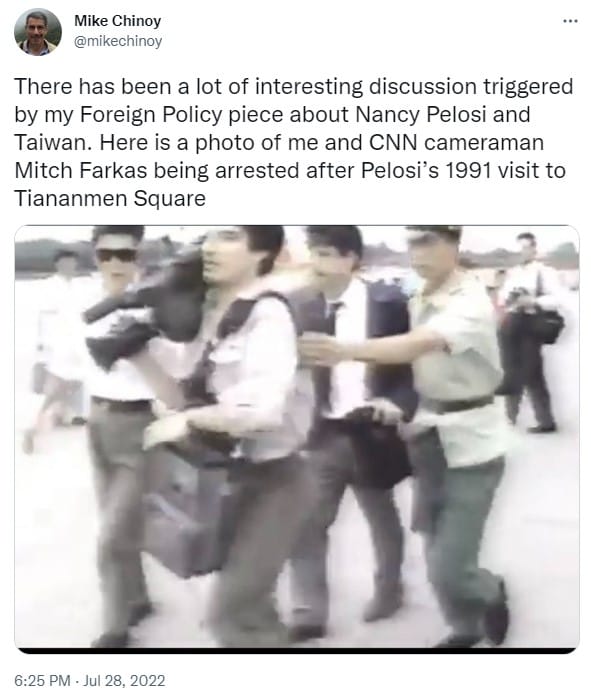
In fact, I am grateful to Congresswoman Pelosi for what she did in Tiananmen Square that day in September 1991. Though she has no idea why I’m grateful, in fact her protest led directly to some of my early successes, including the release of Hong Kong Trade Development Council representative Lo Hoi-sing, son of a senior journalist at a Hong Kong left-wing paper.
Operation Yellow Bird
In the aftermath of the killings in Chinese cities in June 1989, loosely coordinated efforts began to spirit protesters out of China to safe havens outside of the mainland, notably Hong Kong, then a British crown colony. These efforts involved more than 40 people, some of whom were members of triads, others of whom were local Chinese officials. The efforts were dubbed “Operation Yellow Bird 黄雀行动,” and they led to the saving of more than 130 of China’s leading dissident students and intellectuals, including Wu’er Kaixi, Yan Jiaqi, and Su Xiaokang.
These efforts were risky, and some operatives were caught and punished. Lo Hoi-sing (pinyin: Luo Haixing, simple: 罗海星, traditional: 羅海星), a Hong Kong businessman, was detained on October 14, 1989, and formally arrested on December 18 the same year. He was tried with two “co-conspirators,” Hong Kong residents surnamed Li Peicheng (黎沛成) and Li Longqing (李龙庆), on March 4, 1991. After Lo was released, he told me that he didn’t know either Li; he had met them for the first time at trial.
For the crimes of harboring criminals and belonging to a counterrevolutionary group, Lo was sentenced to five years in prison, with three years deprivation of political rights (DPR). Lo was accused of trying to help Chen Ziming and Wang Juntao escape China. He was shipped off to Huaiji Prison in western Guangdong Province. He occupied a cell next to that of Wang Xizhe of “Li Yi Zhe” fame. Li Yi Zhe referred to a group of Guangzhou dissidents who put up posters calling for democracy in the mid-1970s.
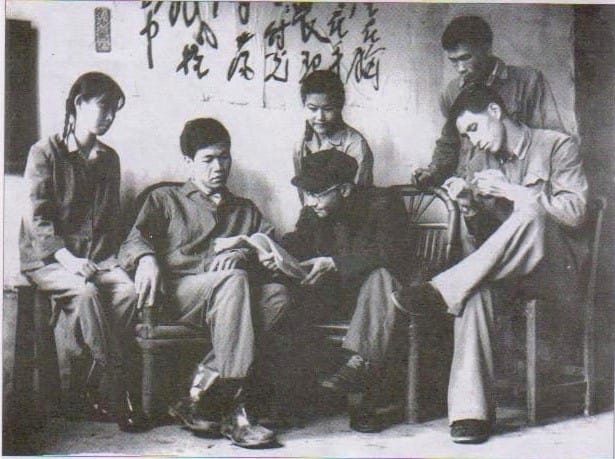
Shortly after Lo Hoi-sing’s trial, his wife, Zhou Mimi (Chow Mat-mat), came to see me at my office in Hopewell Center, a high-rise office building in Hong Kong’s Wanchai District. Ms. Zhou, an author of children’s books, asked me to try to secure her husband’s release. I agreed and began putting Lo’s name on prisoner lists submitted to the Chinese government.
Flight to Beijing
On June 10, 1991, I flew to Beijing for a two-day visit. I was determined to seek clemency for Lo Hoi-sing and the Li Brothers (Li Lin and Li Zhi), two young Hunan labor activists who had escaped China after June 4, but who had returned to Hunan where they were detained. On June 11, at 2:00 PM, I met Supreme People’s Court Vice President Lin Zhen and State Council Deputy Secretary General He Chunlin. I had met He a few weeks earlier in Hong Kong. At that meeting I raised the cases of Lo Hoi-sing and the Li Brothers.
I asked Vice President Lin if Lo Hoi-sing could be considered for early release. His response was hopeful: Lo could be considered for early release under certain conditions. I then asked, in English, about Li Peicheng and Li Longing. Vice President Lin misunderstood me and thought I was referring to the Li Brothers. “In accordance with policy, if they have not committed new crimes after returning to China, they will be released from detention,” the vice president intoned. The next month, the Li Brothers arrived in Hong Kong. They were granted political asylum in the United States. It was my first major success.
North-South Strategy
I returned to Beijing in August 1991. By then, I had garnered a great deal of positive media attention that resulted from my AmCham initiatives, my three congressional testimonies, and the release of the Li Brothers. I had been awarded “Communicator of the Year” by the International Association of Business Communicators. I was considered a media “guru.”
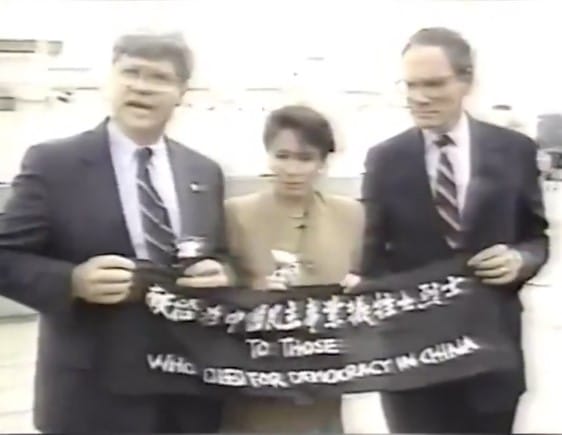
In my meetings with Chinese officials, I made a bold prediction. It was already known that Nancy Pelosi would visit Beijing. I predicted that she would do something “that would make the Chinese government unhappy.” Following the principle that the best way to counter bad news is to release good news, I suggested a “North-South Strategy.” To counter bad news in the north, release good news in the south.” I recommended that Hong Kong resident Lo Hoi-sing be released from prison on medical parole and sent back to Hong Kong with as much fanfare as possible. My interlocutors paid attention and took careful notes.
When Nancy Pelosi unfurled her banner on September 4, 1991, the Chinese government acted quickly. A call was made to the Guangdong government which ordered the immediate release of Lo Hoi-sing. A car was sent to Huaiji Prison from Guangzhou to pick up Lo, but the officers forgot to take Lo’s travel documents with them. The car returned to Huaji before going back to Guangzhou, but Lo Hoi-sing’s release had to be delayed.
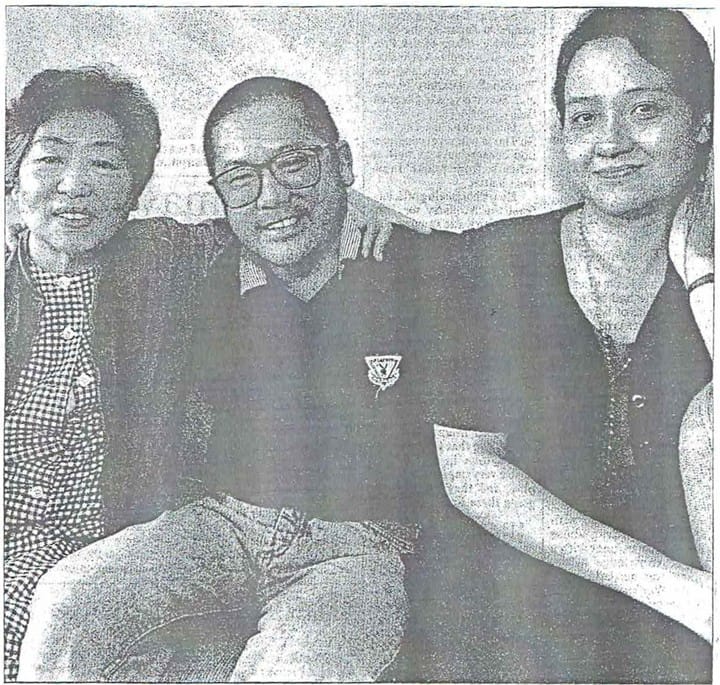
Lo was granted medical parole and he arrived in Hong Kong on September 9, 1991, met with banner headlines and photographs of beaming family members reunited with their loved one. Lo never served his DPR sentence.
British Prime Minister John Major had been in Beijing at the same time as Nancy Pelosi. He flew to Hong Kong’s Kai Tak Airport where he learned of Lo’s release. He immediately set about claiming credit, advancing the preposterous notion that Beijing was grateful for the prime minister being the first Western leader to visit China’s capital since the events of June 1989. I said nothing to contradict Major’s claims, relying on an adage that Ronald Reagan was fond of: “There is no limit to what a man can achieve if he doesn’t care who gets credit for it.”
Visit Dui Hua’s “John Kamm Remembers” portal to read more stories like this, view photos from this period in history, watch videos about the origins of modern US-China engagement, and learn how the decisions of the past are shaping our future.
